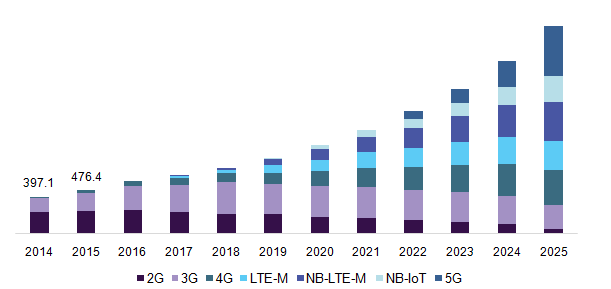Internet of things devices with cellular connectivity make up a substantial portion of the overall IoT market, particularly in the enterprise space where wide-area connectivity and mobility are desired. Here are four predictions for the cellular IoT market:
-Analyst firm Berg Insight said that the top 10 global mobile operators account of 76% of the cellular IoT market and that these top players had a combined base of 407 million active cellular IoT connections at the end of the first half of 2017. China Mobile was the operator with the most IoT connections: 150 million during the period.
“The Chinese mobile operators achieved tremendous volume growth in 2017, driven by accelerating uptake of cellular IoT in the domestic market,” said Tobias Ryberg, senior analyst at Berg Insight and the author of the report. “China Mobile is believed to have reached 200 million cellular IoT connections at the end of 2017.” However, Berg also found that although China is ahead in connections, Western operators generate more IoT revenues. Berg predicts that at least three operator groups will make more than $1 billion in IoT revenues this year: AT&T, Verizon and Vodafone.
-According to an Ericsson IoT forecast, the number of mobile phones is expected to be surpassed by connected things this year. Ericsson said that the number of IoT devices with cellular connections is projected to reach 1.5 billion in 2022, or about 70% of wide-area IoT connections.
-Grand View Research estimated the value of cellular IoT market at nearly $1.8 billion in 2016 and projected that it will reach $9.65 billion by 2025. The firm cited cellular networks’ resilience, ubiquitous mobility, and security as primary drivers for cellular IoT market growth.

“Cellular connectivity in IoT applications ensures massive deployments in sectors such as fleet tracking and management capillary networks and smart buildings, owing to which the application is expected to witness highest growth in the Asia Pacific region,” Grand View said. “The ever-increasing population, high demand for consumer goods, and recent proliferation of the disruptive technology in industrial applications are the major factors driving market growth over the forecast period.”
-In Cisco’s 2017 Visual Networking Index for global mobile traffic, the company noted that bandwidth-intensive IoT applications such as video monitoring are on the rise, with IoT capabilities “similar to end-user mobile devices are experiencing an evolution from 2G to 3G and 4G and higher technologies.” Cisco, which still classifies IoT devices as machine-to-machine traffic, said that on a global basis, connections will grow from 780 million in 2016 to 3.3 billion by 2021, a 34% CAGR and fourfold growth over the forecast period.
Meanwhile, Cisco found that in terms of connected wearables, only seven percent of an estimated market of 929 million wearable devices will have embedded cellular connectivity.
Looking for more information on cellular IoT for the enterprise? Check out RCR Wireless News’ recent editorial special report and webinar.

